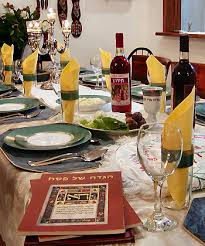
It’s that time of year again. Magazines and newspapers catering to our community are full of advertisements touting the advantages of various Pesach programs. The variety is amazing. Depending on one’s preferences and financial ability, families can go near or far. There are programs within easy driving distance, and there are exotic locations all over the earth. Why not celebrate Pesach in Egypt? I haven’t seen that one yet, but who knows?
Each year, one also sees articles criticizing the phenomenon: If all the money spent on vacations were donated to tzedaka, they say, we could pay the rebbeim more. Or perhaps the criticism is that Pesach is a time to be at home – because how can we deprive our children of the opportunity to share in the cleaning and koshering and myriad preparations for the Holiday of Freedom? Isn’t Pesach the focus of attention by our wives? And isn’t scouring, just as our ancestors did in Hungary, or wherever, something that they hold dear?
In this article, I would like to share some thoughts on Pesach hotels. My expertise is simple, and so is my bias: For many years, our family has been privileged to go away for Pesach as staff to various programs both near and far. I admit that, from the start, we have found it a positive experience.
Let’s start from the beginning: Preparing a home for Pesach is a lot of hard work. I remember when we lived in Kiryat Sanz in Yerushalaym, right after we were married. We rented an apartment from a family that mostly lived in a village in the Negev but had the right to move into the apartment and share it with us when they so desired. It cost us $100 a month, including utilities, and we had no children, so it was worth it. Feigi cleaned the four-bedroom “dira,” and we thought we had done a good job. Then the owners came and cleaned everything over again, as if we had done nothing. In other words, cleaning is a massive task and causes much anxiety for the women. Going away to a hotel takes this pressure away. For older people, especially, the preparations for Pesach can seem overwhelming and going away is a relief for them.
One of most people’s favorite memories is of the whole family together for the Pesach Seder: grandparents, parents, married children, and einiklach, all sharing in the story of the Exodus. I have such memories, and think back fondly to the experience of my father and mother, uncle and aunt, and numerous guests sharing in this ancient rite of retelling the Haggadah.
But it is a very hard job to host so many people, especially when the guests are not coming for just one meal but for many days and many meals. When you include the work of preparing the house, purchasing huge quantities of expensive special Pesach foods, and serving and cleaning up after a large group, you can easily see the advantage of a Pesach hotel. If one has the financial means, or if the grown children share in the costs, Bubby and Zaidy can sit at the table surrounded by their progeny and just enjoy the holiday. If you factor in what Pesach costs at home, the extra cost of going away seems very well worth it.
Now to the specifics of what goes on at a Pesach program. The short answer is that there are many options on how to spend your time. Some people love the activities, and others stick close to family and enjoy that. Nowadays, many of us don’t live near all our children, and this is an opportunity for them to come from all over and spend eight days together, without anyone having to cook, clean, plan activities, etc. It is a real vacation, even for the parents and grandparents. Another option is for family members to come for part of the time.
One ad that caught my eye offers “state-of-the-art resort and spa facilities,” proximity to theme parks, day camp, teen program, and nearby golf and tennis. Then we get to the food: “all-you-can-eat daily barbeque,” “late-night-dessert-spectacular,” and “tea room.” There are also minyanim and shiurim, and everything is under strict rabbinical supervision. Let’s face it: Jews love to eat, especially when it is all included in the price. It is amazing how much food is put out at the breakfast and lunch buffets every Chol Hamo’ed day. The variety and quality is a matter of pride to the hosts. It is also how they distinguish themselves from the other programs.
Most of the programs we have attended are “non-gebrochts,” that is, nothing is cooked or baked with matza meal. I wasn’t raised that way, but there are enough people who are strict about this custom that makes it worth it for the program to cater to them. This means that the huge variety of cakes and cookies are all made with potato starch and not with matza cake meal. You would be surprised at how good the food can be and how much is consumed. The old joke, “The food is no good and there isn’t enough of it” does not apply to any of the programs we have attended over the years. If you go with people who have a good reputation and have been doing this for a while, you are likely to find the food delicious.
The ambiance at the various hotels depends on what type of crowd the program is geared to. Some are for wealthy people, who come with their nannies to take the children to the day camp. They have to offer famous, top-of-the-line entertainers and lecturers of world renown. I remember being at such a program, where we felt a little out of place; it wasn’t for us. But, except for that one year, we have found the people nice and the programs enjoyable.
Some people prefer to fly to warm places, like Florida, New Mexico, or Hawaii. Others prefer locations within driving range. Since most frum Jews live in what is called the tri-state area, many programs are driving distance from New York. For the past several years, Feigi and I and our daughter Rivka have participated as staff at the Pesach program at the Host Resort in Lancaster, Pennsylvania, which has the advantage for us of also being relatively close to Baltimore. I will use that as an example of programming. Keep in mind that you are guests and are free to go or not to go to whatever you desire.
When things are well run, it seems easy, but it isn’t. Serving meals many times a day to 1,000 people requires a lot of coordination. There is a children’s dining room at every Pesach program. Usually, everyone is seated in one large dining room, which makes for noise. This is especially an issue for the Sedarim. Another problem that we encountered in some hotels was that the wait staff did not “get it.” They wanted to serve the Seder meal right away, and we had to explain that the meal should not be served until we were at that part of the Seder. A well-run program prepares the help for the practices of the clientele, and we are fortunate that this one did. Some programs go to the expense of bringing in their own workers from New York, who understand the needs of “our crowd.”
In Lancaster, I conducted the communal Seder, which is for people who want someone to lead the Seder and explain what is going on. Most people prefer to have their own family sedarim, and there are two options: Some opt for a private area, where they do not hear other peoples’ sedarim. It can get distracting if you are singing Dayeinu and they are singing Chad Gadya. This can occur if multiple sedarim are going on in one large hall. In Lancaster, this problem is alleviated, because the guests are divided into numerous smaller ballrooms. Our communal Seder was held in the Paradise Room, so I can honestly say that our Seder was in paradise.
Hotels that cater to a frummer crowd usually have an Ashkenaz and a Sefard minyan and even a hashkama minyan. Since food is very much a feature of any Pesach program, there is a kiddush after davening, with time afterwards for a lecture or shiur. Lunch then follows, maybe around 1:00 p.m. On any given day of Yom Tov or Shabbos, there is a schedule with a variety of talks, sometimes several at the same time for various interests. This is besides the Daf Yomi, etc. On Chol Hamo’ed, you can go on field trips or play golf. Feigi was in charge of fun activities for adults, and Rivka was in charge of the teen girls’ activities. I usually give five talks over the Yom Tov and Shabbos, but not on Chol Hamo’ed, when they bring in entertainers for shows.
One feature that is found at some programs is the presence of shadchanim. One also makes friends from other places, which can help facilitate finding the proper match for a child or even a friend.
In summary, spending the Yom Tov of Freedom in a good Pesach program gives one the opportunity to relax and enjoy the Yom Tov, make new friends, and spend lots of quality time with your family. Perhaps the critics of going away are judging the experience by the programs they are familiar with. We have been fortunate to spend the holiday with friendly, heimishe people, and I have enjoyed the give and take of discussions with people from all over who have experiences to share. Just before last Pesach, the famous refusenik, Yosef Mendelevitch, came to Baltimore and spoke to a large crowd about his experiences in prison and labor camp and his eventual release and aliyah. I bought his book and used it as the theme for one of my talks, but I also asked two individuals to speak from their perspective. One is a prominent attorney who was active in the Soviet Jewry Movement, and the other is a man from the former Soviet Union who now lives in the U.S. and told us about that period from his perspective. Both were at the hotel, and it was a great opportunity. The ambiance of the Pesach program made it possible.
Personally, I think going to a hotel has much to recommend it. Of course, one size does not fit all, and it is worthwhile making sure that you first decide if you want to go away at all, and if you do, to make sure that the program you sign up for is the one at which you will feel most comfortable. Chag kosher vesame’ach.






